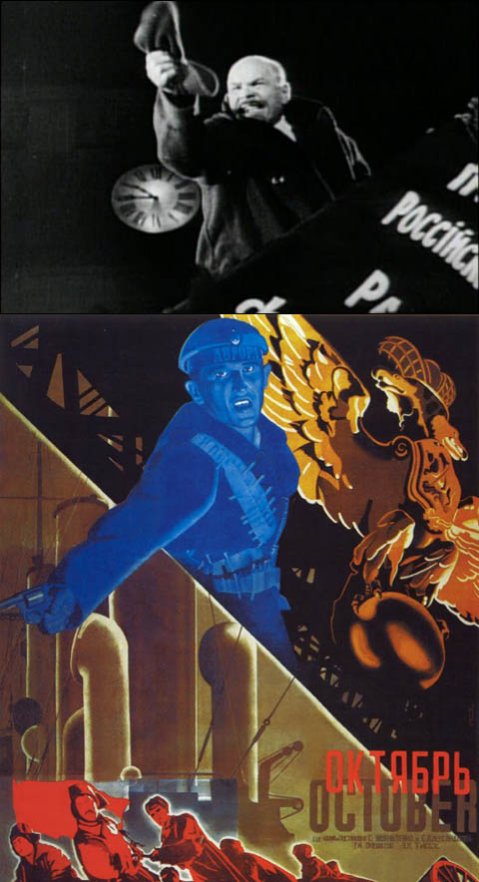Screen/Society--Eisenstein 35mm Retrospective--"October" (rare 35mm screening of the classic film!)

AMI presents a 35mm Film Retrospective in the month of February, dedicated to the great Soviet filmmaker Sergei Eisenstein (1898-1948) and his Revolutionary Aesthetics.
Film Screening:
October: Ten Days That Shook the World
(Sergei Eisenstein, 1928, 103 min, Soviet Union, silent w/ musical score & English intertitles, B&W, 35mm)
-- Introduced by Literature PhD candidate Abraham Geil!
A powerful testament to Eisenstein’s genius, artistry, and ambition, October was made in 1928 to celebrate a decade of communist rule after the October Revolution in 1917. Eisenstein had nearly unlimited resources placed at his disposal, including the run of Leningrad’s Winter Palace for several months. His startling re-creation of the events of 1917 is both a sweeping historical epic of vast scale and a magnificent monument to his fascination with intellectual montage — the juxtaposition of two disparate images to convey an idea or concept not inherent in either image alone. The film’s most celebrated examples of the technique include a baroque figure of Christ reduced, through a series of successive images, to a primitive idol, and Kerensky, head of the pre-Revolutionary provisional government, compared to a preening mechanical peacock. Such metaphorical experiments met with official disapproval; the authorities complained that October was unintelligible to the masses, and Eisenstein was attacked, for neither the first time nor the last, for “formalism." He was also required to re-edit the work to remove references to Trotsky, who had recently been purged by Stalin. October remains an immensely rich experience.
-- Made possible by generous support from the Mary Duke Biddle Foundation.
About Sergei Eisenstein:
One of the cinema’s paramount creative geniuses, both as a director and as a theorist, Sergei Eisenstein was a seminal figure in the development of cinema as a distinct art form with its own unique grammar and language. Some hold him to be the most important and influential individual in the history of the medium, and his writings have been translated into over 20 languages. Principally and fundamentally, it was Eisenstein’s revolutionary notion, so powerfully and thrillingly expressed in his own intensely beautiful, intensely dynamic films, that the essence of cinema is montage: that meaning in cinema — ideas, emotions, rhythm, tone — is created through the juxtaposition, the collision, the editing together, of images.
Eisenstein completed but seven feature films in his career (his filmography also includes a handful of shorts and two notable unfinished works), before dying too young: of a heart attack, shortly after his 50th birthday.
This retrospective offers the rare opportunity to see a handpicked selection of Eisenstein’s works, so often circulated on inferior 16mm copies, in proper 35mm prints. Included are four of Eisenstein’s seven completed features, as well as a reconstruction of Eisenstein’s legendary “lost masterpiece,” Bezhin Meadow (1937).
Cost: Free and Open to the Public!
Sponsors: The Program in the Arts of the Moving Image (AMI), the Duke University Center for International Studies (DUCIS), and the Department of Slavic and Eurasian Studies. Made possible by generous support from the Mary Duke Biddle Foundation.
